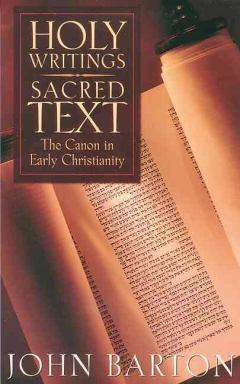
John Barton, Holy Writings, Sacred Text: The Canon in Early Christianity
Westminster John Knox Press, Louisville, KY. 1997. 210 p.
Published in England as: The Spirit and the Letter: Studies in the Biblical Canon
SPCK, London, United Kingdom. 1997.
I first discovered this book about six years ago through the footnotes of Christian Smith’s provocative work: The Bible Made Impossible: Why Biblicism is not a Truly Evangelical Reading of Scripture. Smith challenges the presuppositions of what he terms “solo scriptura,” the evangelical (or even fundamentalist) view that the Bible is all-sufficient. In this view, anyone can read the Bible and discover what they need to know for salvation.*
He lists many problems with this view, but one of the most damning is the observation that if the Bible was really that clear, then why under this approach do we have such widespread interpretive diversity? Let’s park that thought for a moment and look into Barton’s book.
There are several interesting bits in Holy Writings, Sacred Text. Barton examines how different New Testament texts were handled in the early church, and whether or not those means of using them were consistent with how other Scripture (the Old Testament) was handled by these same authors.
He also examines different characteristics of what makes a work sacred, mostly from Judaism, and considers the possible implications for the New Testament. His insights into why Esther, Ecclesiastes, and Song of Songs were questioned as being part of the canon are interesting.
Barton’s main goal in this book is to define the the term “canon” and to examine the implications of the various ways in which the term has been used over the centuries. He also tries to intuit what the Church Fathers thought about the New Testament in particular in terms of the various definitions of “canon.”
If you think this sounds like a niche book appealing mainly to those interested in theology with a bent toward epistemology, I won’t correct you. This is an academic work that is probably found mostly in theological libraries or as the text for graduate-level theological courses. But Barton does draw some conclusions that have implications for a much wider audience.
Much of the work deals with questions of authority, either explicitly or, more often than not, implicitly. After all, the question of canon is a question of what works are authoritative in the life of a believer. In the strictest sense, a canon is a body of works which are both granted authority and are deemed to be complete — no more can be added. This raises the secondary question (which Barton leaves largely untouched), “Who has the authority to grant this authority?”
Barton states this most explicitly in the middle of the book: “…it is universally true that traditions giving an authoritative interpretation of a written text are in effect — though not in intention — more authoritative than the text they interpret.” (p. 102) In other words, whatever person, institution, or “tradition” declares the teaching (or canon) of scripture to be authoritative has more authority than the scripture.
If that seems hard to swallow, consider a more humdrum parallel. When I have been overseas for extended periods, I have signed a general power of attorney for my wife in order to enable her to conduct business on my behalf. It is a very powerful document (and your attorney will caution you before you assign such power to anyone), but I can revoke it as well. If I can give and take away, I have more authority than the document itself, even if it can grant equal authority in terms of signing a lease or some other legal document.
Barton’s work placed a fundamental question in my mind when I first read it, and re-reading it recently has not changed it. “On whose authority do I accept that the Scripture is authoritative, trustworthy, and complete?”
Barton spends a fair amount of time considering the early church councils and the Church Fathers. He’s an Anglican priest in addition to being an Oxford scholar, so that isn’t all too surprising. I concur that those are authoritative sources, if for no other reasons than that they were much closer to the events recorded in Scripture than we are and large groups of people still appeal to them as authoritative.
For me, the real insight of Holy Writings, Sacred Text is that it forced me to examine what I thought about the role of tradition in my faith. It is a question for all believers to consider at some point. How do we know that what we believe is worth believing?
* Smith uses “solo” instead of “sola” purposefully to underline the ideal of “just a believer and a Bible.” Neither he nor I discount that Scripture can speak directly to a person, but as I detailed earlier, this is not normative. We need reason and tradition in order to protect us from drifting into heresy.
